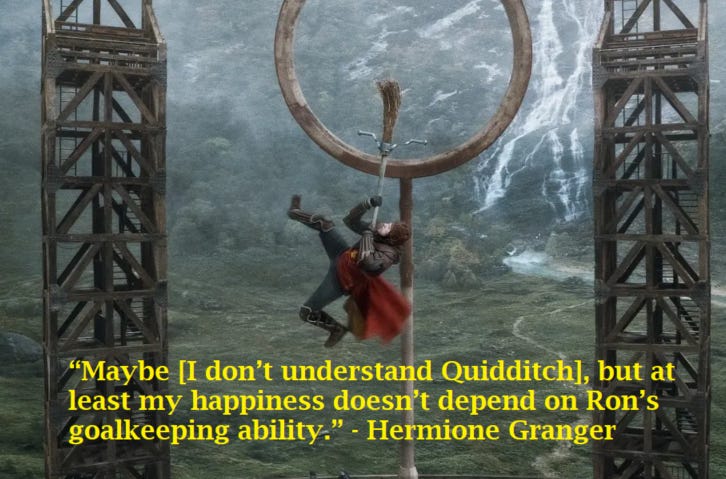🤯Unknown Unknowns #129 - Thinking About Sports
This was the headline of ESPN a few days ago. The Yankees best pitcher, Gerrit Cole, had an MRI recently that was inconclusive but the prognosis was that he would miss a month at the least and potentially the whole season. And the headline is: “Gerrit Cole’s injury jeopardizes Yank’s World Series chances.” Given that Cole won the American League Cy Young Award unanimously last year, No Fucking Really? Yet, I bet if Cole is out for 2 months and the Yankees win the World Series, the headlines will be about how his absence pulled the Yankees together and how they bonded and stepped up.
My interest in sports has declined over the years.
I used to watch every Giants’ game and dozens of Yankees’ games each year. Sundays would be for watching football from noon ‘til midnight. Not just the games, but preview shows, highlight shows, analysis, you name it.
High school, is when the cracks started to appear.
In the middle of my teenage angst, I decided that if one of three things happened, I would be happy: the Yankees winning the World Series, going to college, and getting a car. When the Yankees won in 1996, I quickly found out that no, the Yankees winning the World Series would not be a life-changing event for me.
It wasn’t just disappointment in the fulfillment of what I thought was my dream. I was most confused by the narrative.
The Yankees had lost the first two games before coming back and winning the last four. I remember the headlines about how the Yankees couldn’t cut it, how they were squandering their first postseason in decades, how the Braves were unbeatable after the first two games. And I remembered the headlines switching to how the Yankees were a team of destiny after they won it all. I remember friends saying that the Yankees sucked after two games and then claiming they were die-hard Yankee fans after the comeback.
I couldn’t understand the opinions flip-flopping faster than a politician.
A few years later, Michael Lewis wrote Moneyball, about how the Oakland A’s used statistics to build a winner despite having one of the lowest payrolls in baseball. I became fascinated with finding the truth. Sports could be about explaining what happened, instead of wishing for something to happen and rationalizing afterwards.
I followed blogs on sports statistics and tried to gain edges in fantasy sports. Finally, an approach that made sense, that called out the bullshit.
I never understood fans of consistently bad teams. Why would you be a Knicks’ fan? A Raider’s fan? Ownership and management put out teams that had no shot of winning, but fans would spend hours watching and hoping that this year the team would turn the corner, only to be disappointed every time. And they would get upset when “their” team lost. Why get upset over something you have no control over?
The athletic displays, the charge of electricity and excitement, the feeling of camaraderie - is it possible to keep these while applying some rationality and cutting out the bullshit?
📝 Writing of the Week:
I’ve been writing unpolished, around 100-word mini-essays. Just reflections on ideas from podcasts or things on the news. The latest are on the business and infrastructure of sports:
1️⃣ College Football Realignment
2️⃣ MLB Expansion and Realignment
3️⃣ Amateurism
🔍 Discoveries:
I find this type of sports writing more interesting than reactionary narratives. How can the game be improved? What are the unseen consequences?
1️⃣ The Competitive Advantage of the Pitcher’s Park
2️⃣ Nick Elam’s rule change for the end of basketball games has found its way into mainstream basketball
3️⃣ NFL might steal this rule from the XFL, which could lead to two major changes on kickoffs
💬 Quote of the Week:
“A great way to understand yourself is to seriously reflect on everything you find irritating in others.” - Kevin Kelly
🏴☠️ Something Fun:
👨🔧 If you need help in your writing or creative journey, perhaps I can help you:
⇒ Concept Crafting - Have an idea for an essay but not sure how to get it on paper?
⇒ Whiteboard Ideation - Through a one-hour call, we’ll unlock your ideas
⇒ Course Catalyst - Get the most out of taking an online course
And one way to help me:
⇒ I’m always looking for feedback, and in Cate’s above essay, she suggests this tool for giving feedback anonymously.
You can find more of my writing at chr.iswong.com.
Questions, suggestions, complaints? Email me at [email protected].
Feedback welcome.
If you enjoyed this newsletter, please share it with a friend or two. And feel free to send anything you find interesting to me!
Leaving you in peace,
Chris




Did you find the edge in sports statistics?
If by BS you're talking about the flip-flopping narratives, that's not getting cut anytime soon because there's too much money tied up in BS.
Big cities have multiple sports media companies competing for limited attention. Their job is to write sensational headlines and engaging stories to keep "fans" engaged in the sport in some way to keep making money. These media companies have also realized that it doesn't matter how logical, factual or true the story is. It just has to appeal to emotion. You just wrote about a headline that upset you, which keeps people talking about it. It keeps people engaged with the sport.
Like it or not, it (still) works. Granted, I've heard rumblings that profits in the sports media business might be declining?
But for the time being, what you call BS is what sports media executives call "profit."